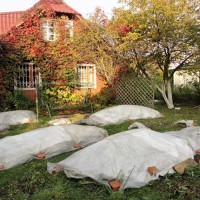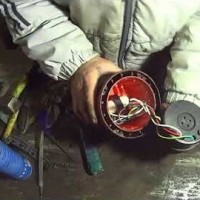Why the geyser hums, clicks, whistles and cracks: causes of problems and ways to eliminate them
The presence of a gas water heater in a house or apartment solves the issue of hot water supply.It is easy to use and, as a rule, does not cause problems for users. Therefore, the situation when a water heating device clicks, whistles, or crackles is, to put it mildly, unpleasant, don’t you agree? But what to do in this case?
In this article we will look at the main reasons why a gas water heater hums and also makes other extraneous sounds. Let's talk about when it is necessary to immediately call a specialist, and in what cases you can restore the operation of the device yourself.
The content of the article:
How does a gas water heater work?
To understand whether there is any threat from extraneous sounds emitted by the speaker, you need to consider all possible reasons. If the column is old, then there will likely be more options. In addition, each model of water heating equipment may have its own characteristic features. But still, the principle of their operation is similar. Therefore, first you need to understand how a gas water heater works and whether you can fix the problem yourself.
Any modern water heating device consists of a rectangular box and a gas and water supply to it. Cold water enters the device and passes through the radiator compartment, where it is heated using a special burner.
As soon as you open the hot tap, a valve in the device opens, which is designed to supply gas to the system.It enters the combustion chamber through a special ignition burner and the process of direct heating of the heat exchange element through which water passes begins.
Carbon monoxide, which is produced after the combustion of natural gas, is discharged to the street through chimney channel. Removal is carried out naturally or forcefully (turbocharged columns).
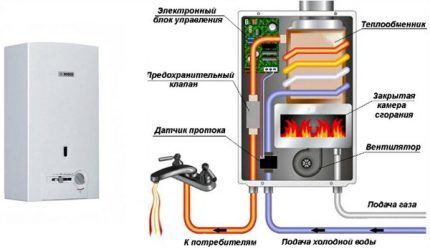
In cases where there is no chimney pipes, but its construction is not possible, they use turbocharged water heater type. The combustion products are removed using an additional fan installed in the device. All exhaust gases are forced out into the street through a coaxial pipe. The design of this chimney also ensures that fresh air needed for combustion is drawn in from outside. Such water heater models are made with a closed combustion chamber.
All geysers are equipped with emergency shutdown systems. As soon as the system detects some kind of malfunction, the water heater will stop working.
Automatic protection is triggered under the following conditions:
- weak draft in the ventilation passage or chimney;
- low fire in the burner, which heats the heat exchanger;
- when the water pressure decreases, the system automatically turns off;
- when the copper heat exchanger heats up excessively.
Let's take a closer look at the causes of malfunctions in the operation of a gas water heater.
Causes of various noises and their elimination
When operating a gas appliance, you may hear a specific noise or crackling noise.To understand why your geyser is noisy and to identify the cause, first inspect the device and listen.
As a rule, every gas appliance makes noise during operation. This occurs when gas is burned, which is supplied under pressure into the combustion chamber.
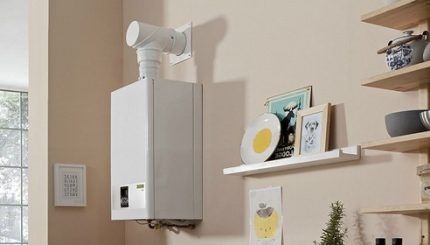
In a poorly ventilated room, these sounds may be heard more strongly. No worries. These sound waves can also be formed during the supply of water, and the crackling sound that comes from the column occurs when metal elements are exposed to an open flame or occurs during ignition from a piezoelectric element.
When hot water is supplied, slight vibrations may occur. They are formed as liquid passes through the system. To reduce the vibration level, it is enough to adjust the water pressure using the valve. By selecting the desired position of the valve, the noise will disappear.
Next, we'll look at the most common problems and determine what causes different types of noise and how to deal with it.
Problem #1 - loud bang when turned on
If you hear a specific loud bang when you turn on the hot water, while the column may vibrate and oscillate strongly, then most likely the gas supply system in the working compartment is faulty. This is due to the accumulation of a large amount of flammable mixture, which does not have time to ignite in time. The accumulated gas creates excess pressure and as soon as it ignites, a small explosion occurs with a characteristic loud bang.
Such circumstances can lead to destruction of the chimney structure, the column itself, or to more widespread destruction. Therefore, you should immediately find out the cause of the problem and fix it. It is best to contact specialists gas service companythat will diagnose and help quickly resolve this problem.
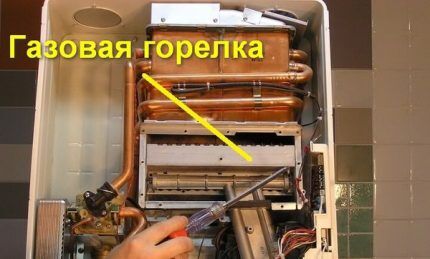
If you want to try to cope with the task yourself, then you can try to inspect the condition of the parts inside the device.
To do this you need:
- shut off the supply of fuel and water to the system;
- remove the upper part of the gas water heater box;
- if traces of debris, dust and soot are visible, then it is necessary to clean the surface thoroughly;
- if there is a lot of soot inside, most likely the injectors also need to be cleaned;
- further inspect the condition of the electrodes, clean or replace if necessary.
Process cleaning is quite labor intensive and complex. Therefore, if you are not sure that you can repair the equipment yourself, it is better to leave this idea. Contact the gas service or specialists so as not to endanger your life and the health of other people.
Problem #2 - the speaker makes loud noise and hums
Usually this phenomenon is associated with weak draft in the chimney or ventilation shaft. To find out whether the pull is in order or not, just light a match or lighter and bring it to the hole.
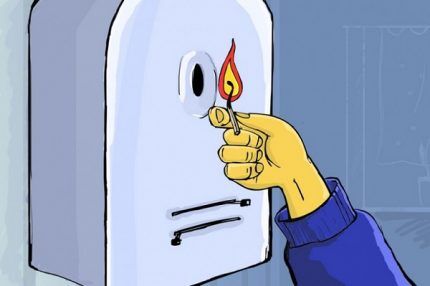
If there is insufficient ventilation, increased noise will also be heard. This usually happens when installing double-glazed windows. They make natural ventilation of the room impossible. In this case, it is necessary to take care of upgrading the ventilation duct or install supply valve for windows or into the wall.
Problem #3 - there is a crackling sound when the device is operating
If you hear something crackling in your gas water heater, then most likely the nozzles inside the device are dirty. Gas is supplied through them and a flame is formed, heating the heat exchanger. To find out and clean the jets, you need to disassemble the equipment in the sequence as described above.
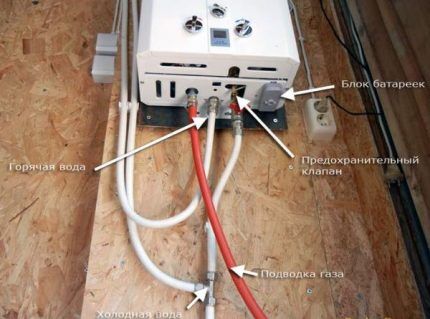
Now let’s figure out why the household gas water heater clicks.
So, in speaker models with electric igniter, there may be several reasons for the crackling sound, namely:
- Batteries. Models with an electric ignition type usually run on batteries. As soon as the batteries lose their capacity, the gas does not ignite immediately or does not burn at all. And the clicks come from a piezoelectric element, which will operate until the flame ignites. To fix this problem it is quite simple replace two batteries.
- Touch sensor failure, controlling the gas flow.Often, under the influence of condensation, the sensor metal oxidizes. In this case, you can try to clean the oxides. But for the device to work correctly, you need to buy a new sensor.
- Candle deformation. If the wick has moved, this may be another reason why the heating device does not work. As soon as you place the candle in its original position, the flame will light up.
- In some cases, the retarder ball may not work – ignition mechanism. Most likely the cause will be a stuck ball. The simplest solution is to remove the product and shake it to free it or otherwise clear the jam.
Loud hums and vibrations may indicate that the connecting gas equipment It was a mistake. To find out the reason, check how the gas and water pipes are connected. Maybe some nuts need to be tightened. In addition, loud sounds and vibrations can be caused by depressurization of the air duct. Fix the problem and the noise will stop.
If the gas burner that heats the heat exchanger has moved to the side, this may cause incomplete combustion of the fuel. You may smell gas. Return the burner to its original position and the noise will disappear.
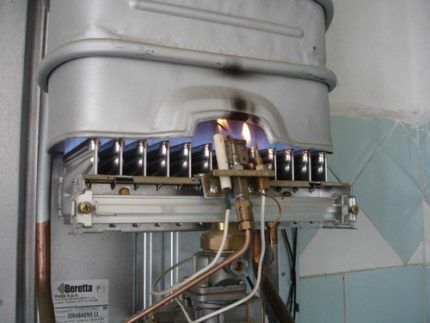
Problem #4 - the gas water heater whistles
Whistling sounds can come from different places in the gas appliance and gas network. Most likely, the reason why a household geyser whistles is the place where the pipes are connected. This means that a gas or water pipe is making noise. First you need to determine where the whistle is coming from.
Then it will be easier to figure out why this happens:
- First of all, you need to block one of the inlet pipes. For example, shut off a gas pipe. We recommend that you familiarize yourself with the reasons noise and vibration of the gas pipe.
- Next, try opening hot water.
- If the whistling does not stop and becomes even louder, then you need to inspect the water supply system. Most often, this problem occurs when the equipment is used for a long time. During the process of heating water, a hard limescale deposit (scale) forms inside the heat exchanger. This helps to reduce the diameter of the holes, thereby making it difficult for water to pass into the system. To fix the problem, you need to clean the heat exchanger with a special solution or replace it with a new one.
- If the dispenser stops whistling when you open the tap, then the problem is in the gas supply system. The flame control valve may have failed. To check, try reducing the gas supply. If the whistle does not decrease, then it is necessary to disassemble the device and clean it.
To prevent scale accumulation in the heat exchanger, experts recommend installing water filters at the cold water inlet. This way you can reduce water hardness and increase the service life of the heat exchanger. The cost of a new one is rather high, so you need to monitor its condition.
So, if you notice that the water pressure is very low, then most likely your filters are clogged or the heat exchanger is clogged.
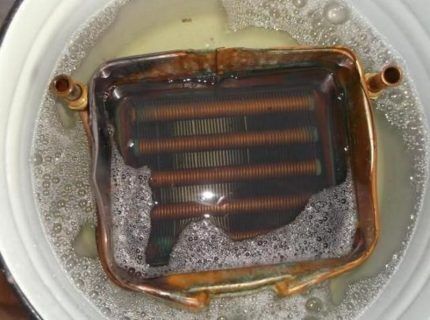
Problem #5 - the device clicks and does not turn on
If, when you turn on the hot water, the column starts to click and does not turn on, then the reason may be a faulty fan. It is designed to discharge combustion products into the ventilation pipe. Typically, such models are installed in apartments of multi-story buildings, and in houses where it is not possible to build a chimney or ventilation shaft.
If the fan is faulty, you will hear the piezoelectric element clicking, but the gas supply valve will not operate, and accordingly the device will not work.
Causes of malfunction:
- Fan blades clogged with dirt and debris. To find out the cause of the breakdown or clean the part, you need to inspect the device. To do this, remove the protective cover and look at the condition of the fan. If it is clogged with dust and debris, clean it and, if necessary, lubricate it with special oil.
- The winding burned out. If the fan does not show signs of life, then most likely the gearbox winding has burned out, in which case it is necessary to replace the device with a working one. Also, stopping can occur due to oxidation of contacts. Check and, if necessary, clean the connection contacts.
If you cannot find or fix the malfunction of your column, then do not waste time and call specialists who will perform all the necessary actions to solve the problem.
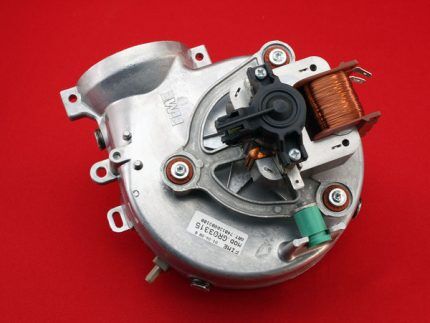
Responsibility for unauthorized replacement
It should be remembered that boiler replacement, water heaters and other gas appliances in an apartment in a multi-storey building or in the private sector should be carried out only by qualified employees who have official permission to work with gas and gas equipment. You can also contact specialists from the state gas service. Self-repair or connection of equipment is not prohibited by law, but it is necessary to understand the full responsibility of such actions.
If you independently interfere with the gas supply system and tap into it without permission from the gas service, you will bear full responsibility in accordance with the federal law adopted in 2018 No. 229-FZ “On amendments to Article 215.3 of the Criminal Code of the Russian Federation and Articles 150 and 151 Code of Criminal Procedure RF".
There is a fine for such violations of up to 80 thousand rubles. Also, the violator may be punished by performing correctional labor for up to 360 hours. The offender can also be sent to correctional labor for up to one year.
In addition, they may be sentenced to restriction of freedom or complete deprivation of freedom for 2 years. In the event that after an independent intervention in the gas system, an accident occurs, as a result of which people were injured. Then the violator will be punished with the same fine, correctional labor for up to five years, and even imprisonment for up to 8 years.
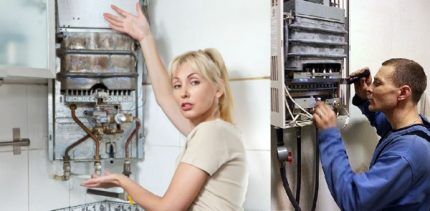
To replace gas equipment, you must have a special permit.If an accident occurs and people are injured, the culprit will suffer administrative punishment upon initial prosecution, in accordance with Article 7.19 Code of Administrative Offenses of the Russian Federation in the form of a fine.
If a violation is detected again by the same person, the violator will be prosecuted in accordance with the adopted Federal Law No. 229-FZ “On Amendments to Article 215.3 of the Criminal Code of the Russian Federation (Criminal Code of the Russian Federation) and Articles 150 and 151 of the Criminal Procedure Code of the Russian Federation (UpK RF)".
Conclusions and useful video on the topic
A video about how to troubleshoot a geyser. A detailed overview of disassembling and repairing a gas water heater at home:
In case of any type of malfunction, as a result of which the gas water heater hums and crackles, you can try to fix the breakdown yourself. But there is no guarantee that you will not damage the device. Therefore, the best option would be to contact a specialist for servicing your gas water heater.
If your speaker is still under warranty, then don’t hesitate to contact a specialist. They will eliminate the cause of the malfunction free of charge and repair or replace the necessary parts of the equipment..
Would you like to supplement our material with useful information on eliminating the causes of excessive noise and crackling noise from a gas water heater? Or would you like to clarify a couple of diagnostic points? Ask your questions to our experts, leave comments, participate in the discussion - the feedback form is located below.
